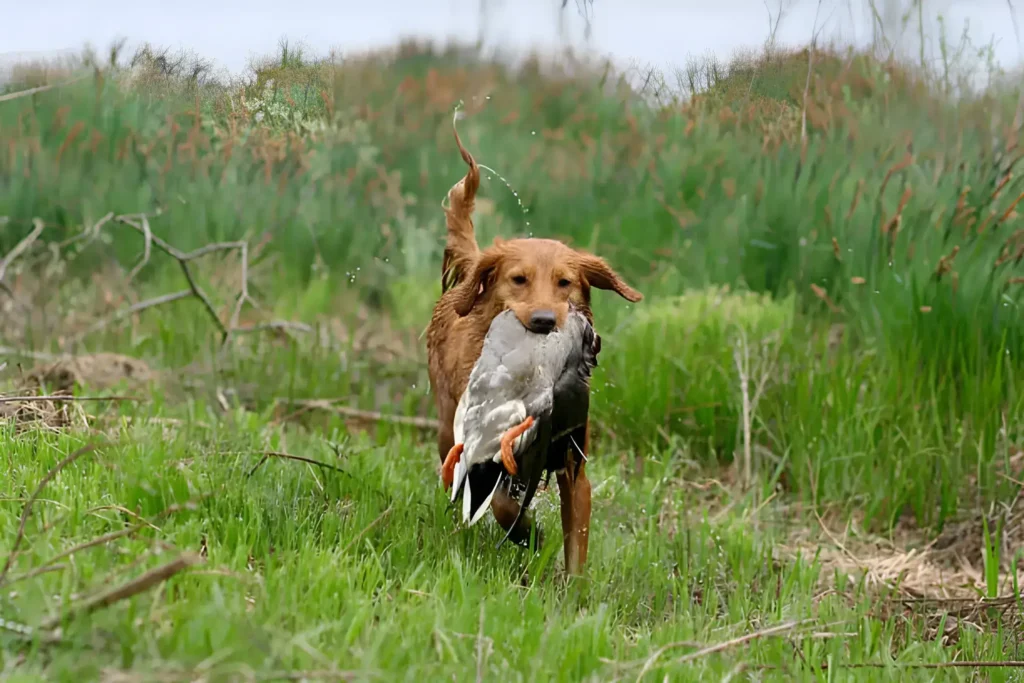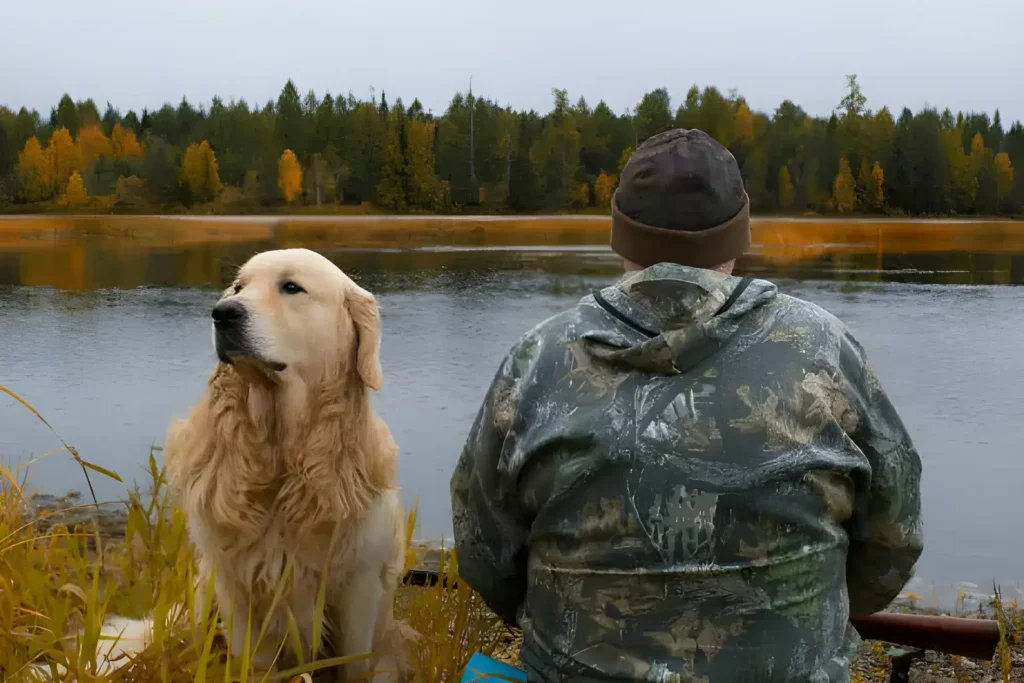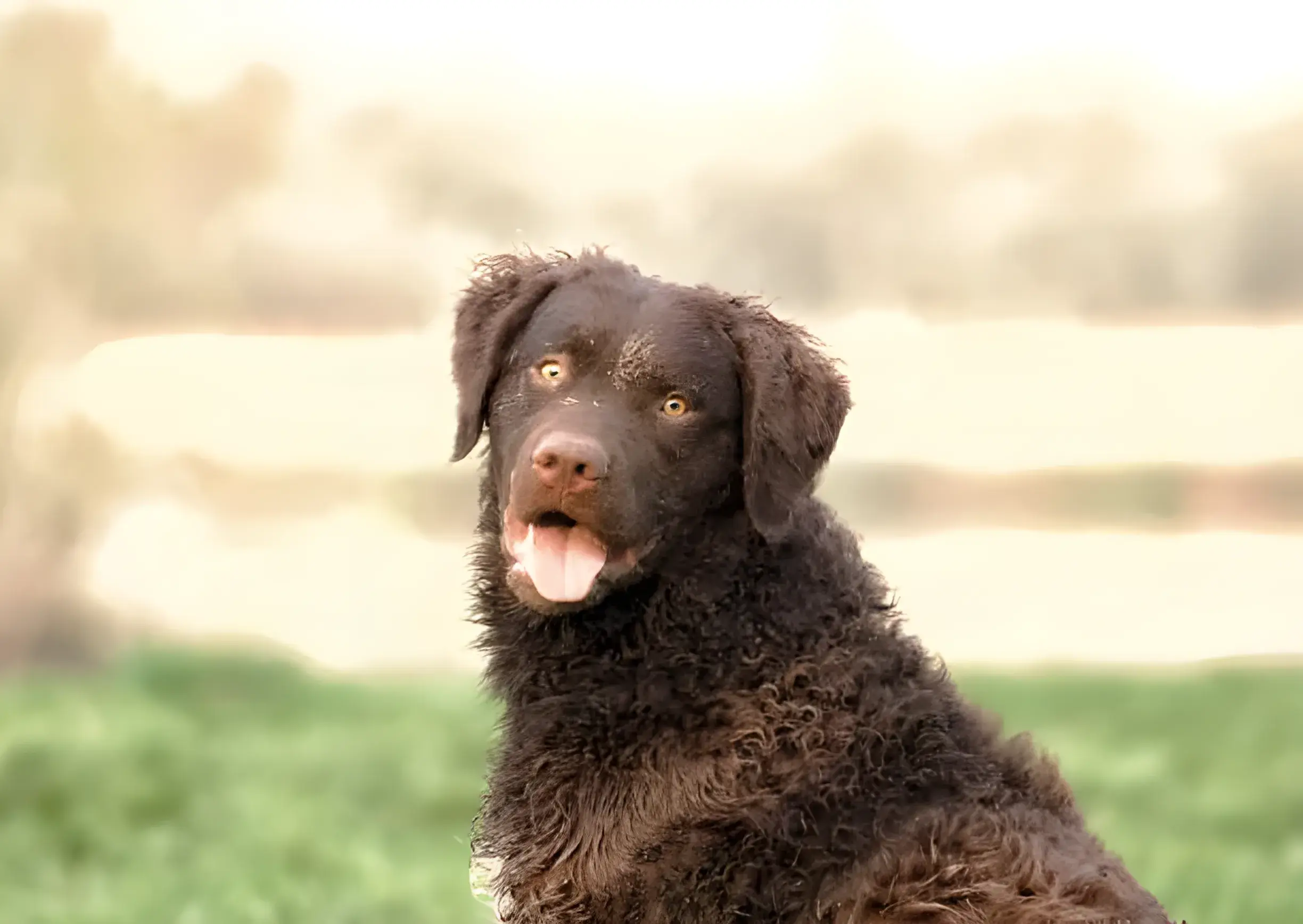If you dream of a hunting partner who loves a muddy marsh as much as you do, you need a specialized duck dog. These incredible canines are built for cold-weather retrieves, relentless determination, and a soft mouth to bring back your downed birds. Let’s dive into the world of duck dogs – from the classic retrievers to some surprising choices.
The Waterfowl Retrievers: Labs, Chessies, and Goldens
These breeds are the rockstars of duck hunting for good reason. Labrador Retrievers, Chesapeake Bay Retrievers, and Golden Retrievers possess:
Cold-Water Endurance: Thick, double coats and an otter-like love of water mean they thrive in harsh conditions.
Marking Mastery: Their eyesight is phenomenal for tracking downed birds, even across long distances in choppy water.
Gentle Mouth: They’re bred to retrieve delicate waterfowl without damaging the prize.
Beyond the Lab: Versatile Hunters You Might Overlook
Don’t limit yourself to the classics! Consider these often-unexpected duck-hunting specialists:
Pointers: German Shorthaired Pointers, Wirehaired Pointing Griffons, and similar breeds excel at flushing ducks in marshy areas, and can be trained for excellent retrieves. Note: Their shorter coats may need protection in icy conditions.
Spaniels: Boykin Spaniels, English Springer Spaniels, and others have boundless enthusiasm perfect for flushing ducks from thick cover. They’re often better suited to hunts in warmer climates.
The Curly-Coated Retriever: A less-common retriever with incredible water instincts and a protective, waterproof coat.
Size Isn’t Everything: Compact Duck Hunting Powerhouses

Nova Scotia Duck Tolling Retriever: Don’t let their smaller size fool you! “Tollers” have a playful hunting style that attracts curious ducks, and the stamina for all-day hunts in rough water.
American Water Spaniel: Compact, curly-haired, and filled with energy, this breed is designed for tight cover and smaller boat hunts.
Is a Mixed Breed the Right Choice?
Absolutely! Many mixed breeds from shelters possess the heart and instincts of a great duck dog. Look for:
- Water Obsession: Does the dog dive in without hesitation, even in cold weather?
- Retrieving Drive: A natural instinct to fetch and bring back toys or sticks.
- Trainability: Attentiveness and a desire to please are crucial for specialized duck hunting commands.
Duck Dog Essentials: Traits Beyond the Breed
Temperament: Steadiness in the blind, tolerance for gunfire and long waits are vital.
Health: Hip and joint issues can be common in working breeds, ensure proper certifications from the breeder.
‘Soft Mouth’: This ensures the bird arrives in good condition.
Training Your Waterfowl Warrior
Beyond ‘Fetch’: “Back” (for blind retrieves), hand signals and decoy work are unique to duck hunting.
Gunfire & Game: An early, positive introduction to gunfire and waterfowl scent builds excitement, not fear.
Professional Help: Specialized trainers understand the complexities of waterfowl work.
Regional Considerations

Matching Dog to Habitat:
The perfect duck dog breed for you depends on where you plan to hunt most often. Consider these factors:
Climate: For frigid northern hunts, prioritize breeds with thick, double coats (Labs, Chessies)
Terrain: Open water calls for strong swimmers (Labradors), while dense cover might benefit from a smaller, agile spaniel (Boykin Spaniel).
Local Expertise: Consult experienced duck hunters in your area for insights on breeds that excel in your specific region’s challenges.
Duck Hunting Stories
Real-World Examples:
- The Day My Golden Retriever Saved the Hunt: “The icy water was no match for Gus’s enthusiasm. He plunged in after a downed mallard, seemingly unfazed by the cold. His unwavering dedication and gentle retrieve made that hunt unforgettable.”
Hunter Spotlight:
- Quote from a Local Trainer: “Here in the Pacific Northwest, visibility can be a challenge in thick brush. The American Water Spaniel’s maneuverability and keen nose are invaluable assets for retrieving birds that might otherwise be lost.”
Resources & Next Steps
Finding a Reputable Breeder:
- Look for breeders who prioritize health testing, temperament, and adherence to breed standards.
- The American Kennel Club and breed-specific clubs can provide resources for finding reputable breeders.
Test the Waters: Many local retriever clubs or hunting organizations offer introductory training days or hunt tests. Attending an event is a great way to see different breeds in action and talk to owners about their dogs.
The Shelter Option: Don’t overlook the potential of mixed-breed rescue dogs. Many have the instincts and trainability to be fantastic waterfowl companions.
Conclusion
The perfect duck dog is a combination of breed, individual personality, and the incredible bond you build through training. There’s a waterfowl warrior out there for every hunter – get ready for muddy paws, unforgettable retrieves, and a partnership that will last a lifetime.
The photo featured below the post headline is Credit: Wirestock/istockphoto
I hope you find this post helpful and informative. If Yes’ feel free to share it with your friends!
Frequently Asked Question
Can any dog that loves water be a duck dog?
While enthusiasm is key, the right breeds bring instincts and physical adaptations that make them excel in the cold, challenging conditions of duck hunts.
Do I need a purebred dog for duck hunting?
Absolutely not! Mixed breeds can be fantastic duck dogs, focusing on traits like water drive, trainability, and overall health.
Is duck hunting cruel to dogs?
Responsible duck hunting with a well-trained dog is not cruel. Dogs bred for retrieving thrive on the work, and ethical hunters prioritize safety and respect for both the dog and the hunted waterfowl.
What is the best age to start training a duck dog?
Start basic obedience and water introduction as early as 8-10 weeks old. More specialized duck hunting training often starts around 6 months but varies by breed maturity.
How do I train my dog for duck hunting blinds?
Practice steadiness in small, confined spaces to mimic a blind. Introduce decoys and simulate gunfire gradually, rewarding calm behavior.
My duck dog is afraid of gunfire, what do I do?
Start with very low exposure at a distance, pairing gunfire with treats and praise. Gradually increase volume as the dog desensitizes. A professional trainer can help with severe cases.
Are there health problems common in duck hunting dogs?
Hip dysplasia, ear infections (from water exposure), and field injuries are risks. Ask breeders about health testing, and be vigilant about preventative care.
How can I keep my duck dog warm in cold weather?
Neoprene vests, quick-drying after retrieves, and limiting exposure time prevent hypothermia. Certain breeds require more protection than others.
What gear do I need for my duck dog?
Basics include a well-fitting collar, leash, neoprene vest (if needed), and possibly doggie ear protection for very loud hunts.
How do I find duck-hunting dog training near me?
Retriever clubs, hunting organizations, and online searches like “[Your State] duck dog trainers” are great resources.
Do female duck dogs make good hunters?
Absolutely! Hunting ability is based on individual dog temperament and training, not gender.

